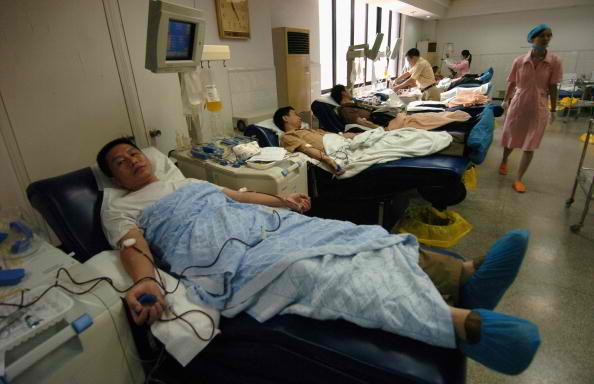Chinese employees are worrying more about their career prospects--not because of concerns directly related to professional performance, but because of compulsory blood donation. Coercive approaches to blood donation are spreading in China, amid pressures to keep up with high demand for blood.
In a Global Times report, government workers in Jiangsu Province have spoken about how they have been forced into donating blood in exchange of rosier professional opportunities. Those who have refused to donate blood reported that they had points counted against their annual evaluations.
Zhangjiagang, in Jiangsu Province, has been actively engaged in setting blood donation targets among its working population, claiming that no one has opposed said initiatives. But Shen, a government worker in the city, said that while there's nothing wrong with blood donation, making it compulsory is "weird."
Nonetheless, a report from Sixth Tone noted that government workers in Jiangsu Province are not punished individually for refusing to donate blood, according to a Red Cross Society center there. Such clarification comes amid the existence of a so-called "blood donation index."
The blood donation index in Jiangsu Province is used to ensure that government offices therein would keep up with blood donation quotas (18 percent of each office's workers) for them to be deemed as "civilized units." It's part of a greater scheme made to address China's blood donation shortage.
China welcomed 2016 with a blood crisis, which affected 50 out of the country's 70 major cities, many of which saw their hospitals close due to a severe shortage in blood supply. Such crisis has created a lucrative black market involving the sale of blood--a practice that's currently prohibited by law.
Prior to the ban, donating blood for commercial purposes has been allowed throughout the 1990s, although it has caused a bevy of problems relating to sterilization of equipment. The previous setup, notorious for unhygienic processes, contributed to the spread of bloodborne diseases such as HIV/AIDS.
Still, many among the Chinese public continue to react with reluctance when it comes to blood donation. With that, it remains to be seen whether implied compulsion in blood donation would be helpful at all in addressing China's chronic blood supply problem.



























